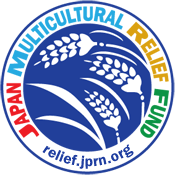History and Timeline
2011
March
Japan Multicultural Relief Fund (JMRF) was jointly founded by Japan Pacific Resource Network (JPRN) and Eclipse Rising (ER) in the wake of the Great East Japan Earthquake and Tsunami
JMRF is endorsed by the Peace Development Fund (http://www.peacedevelopmentfund.org/).
March 23
Marvin Gibson (JPRN Board President), Miho Kim and Akane Nobusa (JMRF) participated in the San Francisco Board of Supervisors Fundraiser at SOM Bar, San Francisco
April 1-2
JMRF participated in the Park Chalet Garden Restaurant Fundraiser, San Francisco
April 7
JMRF participated in the Social Justice Fair at San Francisco State University, San Francisco
April 10
JMRF along with the Bay Area Japanese Newcomers participated in the Anti-War & Anti-Nuke Rally at Dolores Park, San Francisco
April 17
JMRF presented at the Uhuru Solidarity Movement's Earth Uprising: Teach-in and Musical Benefit, San Francisco
April 23
JMRF participated in the We Are One Island: Japan Relief Concert and Auction, Oakland
May
JMRF delivered the relief grant of 500,000 yen (appx. $6,348) to the seven grassroots organizations that work with "marginalized" communities in the disaster-struck region, including foreign residents, migrant workers, single parent households, people with disabilities and elders.
For several of these organizations, JMRF grant proved to be the first relief fund to reach them - before government or other private sources
See JMRF Newsletter: http://relief.jprn.org/newsletter.php
May 1
Bake Sale for JMRF organized by Berkeley Elementary Students
May 7
JMRF presented at the conference: Immigration at the National and Local Levels in Japan held at University of California, San Diego
June 12
Reach Across the Pacific: Youth Music for Japan Relief organized by Oakland Middle School Students
August 11
JMRF visited NPO Woori Hakkyo (1 of the 2011 JMRF Grantees) in Tokyo, Japan
September
JMRF conducted the Interim Surveys and Interviews with the seven grantees in regards to how the grant has been used, what kind activities and programs have been run, assessment of issues on the ground, and goal-setting for the reconstruction phase
See JMRF Newsletter: http://relief.jprn.org/newsletter.php
October 12
JMRF presented at the “People with Disabilities/Elderly” workgroup organized by City of Richmond Fire Department’s Emergency Services
October 23
JMRF presented at the San Diego Asian Film Festival
November 10
JMRF participated in the ALIGN-Alameda Linking Interfaith Groups & Nonprofits
December 3
JMRF endorsed the No Nukes Actions Committee event, “Fukushima, The Lessons of Nuclear Power and the Media” and presented at San Francisco State University, San Francisco
December 10
JMRF slideshow presentation at the Amagasaki Human Rights Festival in Amagasaki, Japan
December
JMRF connected Occupy Berkeley and Fukushima Women's Anti-Nuclear Movement which sent a box of knitted hats and scarves to women from Fukushima who protested at Tokyo Electric Power Company (TEPCO) and the Ministry of Economy and Industry in Tokyo, Japan
December 30
Released the 2011 JMRF Newsletter to report how donations have made positive impacts on the victims and survivors, particularly those in the “marginalized” communities in the disaster-struck regions.
See JMRF Newsletter: http://relief.jprn.org/newsletter.php
2012
February
JMRF connected KoreAm Magazine and NPR and two Korean schools in the disaster-struck region in the process of reconstruction.
See KoreAm article: http://iamkoream.com/march-issue-revisiting-japan-a-year-after-the-tsunami/
Listen to NPR program: http://www.npr.org/2012/03/09/148304286/for-kids-in-japan-adjusting-to-a-changed-world
March
2011 Grantee Final Reports submitted


